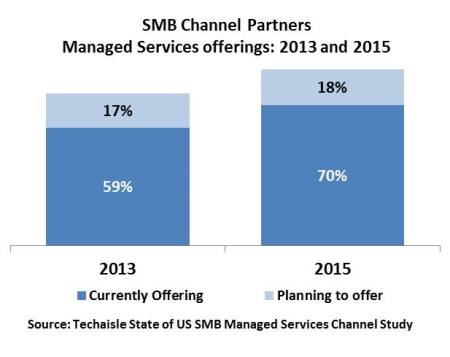This is a two part blog article. The first part, published earlier, reviewed the predictions we made for 2015 and the second part, below, focuses on outlook for 2016 and for the longer term (2017 - 2020).
Top 10 Predictions for Year 2016
1. 2016 will see even more intense emphasis on “CIA-Plus”
IT Suppliers will begin to align their offerings with Cloud, IoT, and/or Analytics; products that do not address end-user needs in these areas will be positioned as infrastructure and integration services needed to capitalize on these technologies. This trend, like hybrid IT, will continue into 2017. In 2016, Cloud and Analytics will remain among the top five IT priorities of SMBs and midmarket businesses. IoT will inch its way up into the priority list, though adoption will remain limited.
2. Rise of IoT will be constrained by a lack of real-world examples
From a buy-side perspective, the rise of IoT will need to be fueled by real-world examples showing the benefits of automating tasks and processes within IT and in other sectors. Within the SMB community, we expect sporadic implementation and a lack of concerted effort towards creation of IoT strategy, even though IT suppliers will continue to push forward their solutions hoping to remain top-of-mind in order to claim leadership in this emerging space. Each IT supplier will create its own solution set causing decision and adoption inertia, despite the wave of innovation that we expect to see emerge from the smaller & more agile IoT providers that are able to more easily align IT expertise with real life solutions. Experienced consultants and system integrators in particular will hold sway in matching SMB adopters with suppliers.
3. IoT supplier success will be determined by ecosystem management
On the sell side, the rise of IoT will be accompanied by an intense wave of interest in ecosystem management. It is difficult to buy or sell a “box of IoT”, though providers will claim to provide complete solutions. Parenthetically, this constraint is not limited to IoT. While it is possible to sell a “box of cloud” under the right circumstances, only AWS really manages to do so. And while one can sell a “box of analytics”, the boxes themselves come in a lot of different shapes and sizes. To meet SMB and enterprise buy-side demand for IoT, sellers will assemble coalitions that provide the many products and services that comprise an IoT solution. This will make alliance management a key success factor in the marketplace. The last time alliances determined market leadership; SAP became the global standard in ERP. Niche value added reseller may find a new source of success in IoT.
4. Business transformation will continue to elude analytics users
Analytics users will find that they are not achieving the expected benefits, prompting divergent responses. Some SMBs will find that analytics has not been transformative, and will blame the technology; others will look to move past descriptive and diagnostic views, piloting predictive or prescriptive initiatives. One of these responses is clearly more sensible than the other, but that does not mean it will be universal, at least in 2016. Focus on visualization will increase (mine is better than yours), on how the technology can solve business issues and challenges for SMBs and midmarket customers. Simplified implementation of customer and social analytics will be key drivers of adoption.
5. “Hybrid” will be used more often in conjunction with “IT” than “cloud”
User organizations will accept the notion that their focus on cloud needs to evolve into a focus on hybrid IT, as firms realize that their platforms and management scope must encompass on and off-premise systems. Truthfully, there is still a lot of work to do in cloud adoption. But the nature of the discussion has changed from “what and how do we move to the cloud?” to “what do we do to build an integrated, manageable infrastructure?” In 2016, there will likely no longer be an infrastructure debate about use of cloud, but there will be an important emerging discussion around managing hybrid IT.
6. Collaboration will drive “silo” to the realm of four-letter words
Anywhere, anytime also means any type of collaboration. SMB & midmarket businesses will look for unified shared workspaces that allow employees to enter into the workspace from any entry point to work together, collaborate and interact. Collaboration solutions cannot be deployed on stand-alone platforms – they need to be viewed as a framework for integrating multiple capabilities, native to multiple applications.
















